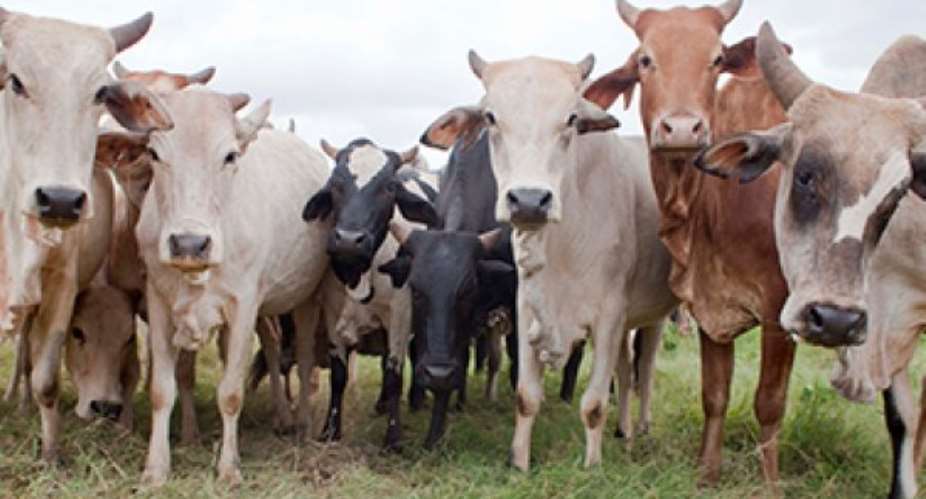When the team visited the Bolgatanga market to ascertain the progress of business in the midst of the Pandemic, it was revealed that the demand for animals especially cattle and small ruminants had decreased.
Since the outbreak and spread of the coronavirus in the country, government has undertaken a number of measures including; the closure of the country's borders to foreigners and a ban on public gathering among others.
All Metropolitan, Municipal and District Assemblies at their own levels implemented stringent measures including; the closure of markets especially on market days, relocation of traders among others as part of efforts at curbing the rapid spread of the virus.
The Upper East Region which has so far recorded 19 positive confirmed cases of the virus with one death was no exception of these regulations and the situation is having a toll on the livestock business value chain.
Speaking with dealers of both the cattle and small ruminants in the Bolgatanga Municipality, they complained that since the spread of the virus in the country, their businesses had almost come to a standstill.
They said their daily sales had dwindled and the number of customers continued to reduce by the day leading to low income levels.
They said due to the closure of the borders, people who used to bring animals from neighbouring Burkina Faso were unable to do so.
At the small ruminants market in Bolgatanga, it was observed that many ruminants such as goats and sheep among others were on sale, but there were no customers to purchase them.
Mr Akolbire Adongo, Chief of the Small Ruminants Association, said since the Bolgatanga Municipal Assembly closed down the Bolgatanga Markets on four consecutive market days, their businesses had declined.
He said people who used to travel from outside the region including; Burkina Faso and the North East Region, no longer patronized the market for fear of contracting the virus.
The Chief disclosed that some of the ruminants which were sold at GHC500.00 and GHC300.00 were being sold at GHC350.00 and GHC200.00 respectively.
Mr Adongo explained that apart from the COVID-19 pandemic which had prevented traders from transporting the animals from the region to the southern sector, the Ramadan season of fasting was also a contributory factor.
Mr Ayela Apana, the Chairman of the Bolgatanga Cattle Dealers Association, said due to the restriction on movement, it was difficult for them to get cattle to buy for sale, thereby making the prices of the cattle to increase.
He said people who used to bring cattle from outside the region no longer did so due to the numerous restrictions put in place by government to fight the coronavirus pandemic.
Mr Timothy Timbil, Secretary of the Bolgatanga Butchers Association, said the hospitality industry and the chop bars, restaurants and other food vendors were major stakeholders in the livestock value chain but due to the coronavirus the patronage had reduced as most of the facilities had closed down temporary.
“I used to slaughter about three cattle in a day but due to the emergence of the coronavirus coupled with the Ramadan when I even slaughter one cow, I always struggle to sell all the meat and it is having a toll on my daily earnings.”
---GNA





 SSNIT must be managed without gov’t interference – Austin Gamey
SSNIT must be managed without gov’t interference – Austin Gamey
 Ejisu by-election could go either way between NPP and independent candidate — Gl...
Ejisu by-election could go either way between NPP and independent candidate — Gl...
 We never asked ministers, DCEs to bring NPP apparatchiks for returning officer r...
We never asked ministers, DCEs to bring NPP apparatchiks for returning officer r...
 No one denigrated the commission when you appointed NDC sympathizers during your...
No one denigrated the commission when you appointed NDC sympathizers during your...
 Used cloth dealers protests over delayed Kumasi Central Market project
Used cloth dealers protests over delayed Kumasi Central Market project
 A/R: Kwadaso onion market traders refuse to relocate to new site
A/R: Kwadaso onion market traders refuse to relocate to new site
 Dumsor: Corn mill operators at Kaneshie market face financial crisis
Dumsor: Corn mill operators at Kaneshie market face financial crisis
 Jamestown fishermen seek support over destruction of canoes by Tuesday's heavy d...
Jamestown fishermen seek support over destruction of canoes by Tuesday's heavy d...
 Election 2024: EC to commence voter registration exercise on May 7
Election 2024: EC to commence voter registration exercise on May 7
 Western Region: GWL hopeful of restoration of water today in Sekondi-Takoradi
Western Region: GWL hopeful of restoration of water today in Sekondi-Takoradi
